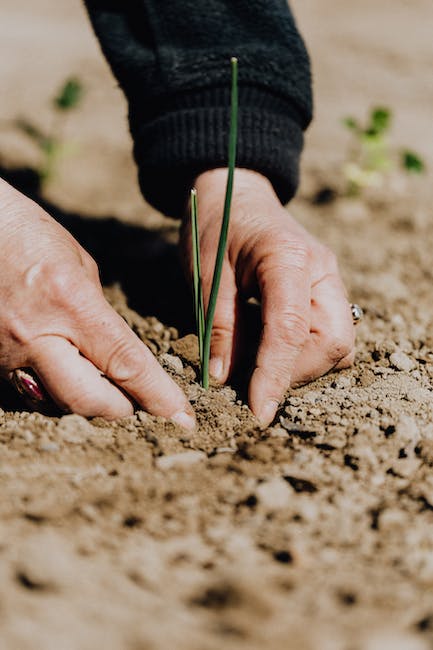Gardening is a wonderful way to grow your own fruits, vegetables and herbs, but with that comes the risk of certain pests and critters invading your garden. If pests and insects start to take over, not only will it ruin your crops, it will also be a nuisance and a hazard to you and your family. Fortunately, there are some simple gardening hacks that can help you prevent pests from entering and wreaking havoc on your vegetable patch. In this article, we explore five such hacks and show you how to get the most out of your garden, and protect it from pesky critters.
1. Using Organic Pesticides
Organic pesticides are an ideal way to protect your plants and gardens from pests, while still being safe and affordable. These pesticides are typically derived from natural ingredients, such as neem oil, garlic oil, or pyrethrin, and are effective at controlling pests without causing any harm to plants, animals, or humans. Organic pesticides are typically applied as a drench or spray, and provide a natural barrier against all types of pests.
A. Applying as a Drench
When applying organic pesticides as a drench, you simply dissolve the pesticide in water and apply it directly to your plants. This will ensure that pests are kept away from your crops, while also giving your garden an extra boost of minerals and nutrients which can help your plants grow and flourish.
B. Applying as a Spray
Organic pesticides can also be applied as a spray. To do this, you simply mix the pesticide with water and spray it directly onto your plants. This will help create a physical barrier between the pests and your plants, and act as a natural pesticide to ward off any intruding bugs.
2. Enhancing Your Soil Quality
Good soil quality is essential for keeping pests away from your garden. By improving your garden’s soil, you can help ensure that your plants get the proper nutrients and minerals they need. This not only helps you to grow healthy and robust plants, but also helps prevent pests from invading your garden or taking over your crops.
A. Composting
One of the best ways to enhance your soil quality is by adding compost. Compost is made from organic matter, such as food scraps, yard clippings, and other biomass, and helps enrich the soil by adding beneficial microorganisms and decomposing matter. This is a great way to add essential nutrients to your garden and make sure your plants receive the nourishment they need to thrive.
B. Mulching
Mulching is another great way to improve soil quality and protect your plants from pests. Mulch is made of organic materials such as straw, grass clippings, or leaves and provides a physical barrier against pests and insects. By adding a layer of mulch around your plants and garden, you can help keep them safe and free from pesky critters.
3. Creating Garden Barriers
Garden barriers are an effective way to protect your plants from pests and insects. You can create a barrier using items such as sticks, rocks, or stones, and place them around the perimeter of your garden. This will create a physical boundary that can help keep unwanted critters from entering your garden and wreaking havoc on your crops.
A. Sticks and Twigs
Sticks and twigs make great garden barriers. You can use them to create a wall around your garden, and the sharp points will deter most critters from climbing over it.
B. Rocks and Stones
Rocks and stones are another great option for creating a barrier around your garden. The stones will be heavy and difficult for critters to move, and can help safeguard your crops from any intruders.
4. Planting Disease-Resistant Plants
Certain plants are more resistant to disease, pests, and insects than others. By planting disease-resistant plants in your garden, you can help protect your garden from a variety of different pests. Examples of disease-resistant plants include oregano, mint, basil, rosemary, thyme, and lavender.
5. Attracting Natural Predators
Sometimes, the best way to ward off pests and insects is to attract their natural predators. This can be done by planting certain plants that attract beneficial insects, such as ladybugs and lacewings, or by setting up birdhouses in your garden. These critters will help keep the pests away and help protect your crops.
People Also Ask
What are the best ways to prevent pests in the garden?
The best ways to prevent pests in the garden are using organic pesticides, enhancing your soil quality, creating garden barriers, planting disease-resistant plants, and attracting natural predators.
What plants attract beneficial insects?
Plants that attract beneficial insects include oregano, mint, basil, rosemary, thyme, and lavender.
How can I protect my garden from pests?
Protecting your garden from pests can be done by using organic pesticides, enhancing your soil quality, creating garden barriers, planting disease-resistant plants, and attracting natural predators.
What are some natural and organic pesticides?
Natural and organic pesticides include neem oil, garlic oil, and pyrethrin.
What can I use to create garden barriers?
You can use sticks and twigs, rocks and stones, or a combination of the two, to create a physical barrier around your garden.
Final Words
Pests and insects can be a nuisance and a hazard to your garden, and it’s important to take the necessary steps to keep them away. Fortunately, there are simple gardening hacks that can help you prevent pests from entering and wreaking havoc on your garden. By following the five tips listed above, you will be able to keep your garden and crops safe and free from pests, while also getting the most out of your gardening experience.

